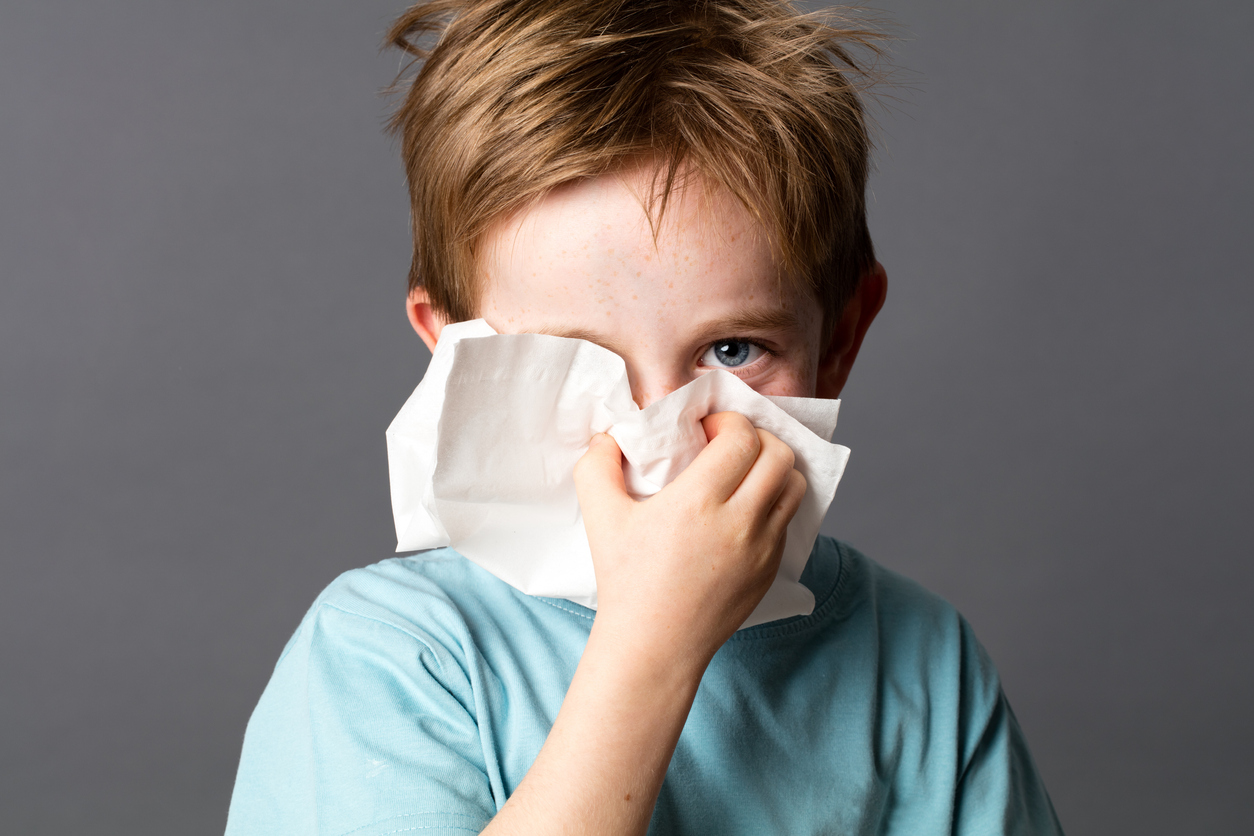When your child can’t stop rubbing their itchy eyes and seems to have an endless supply of tissues for their runny nose, you might be witnessing the classic signs of hay fever. Despite its name, hay fever rarely involves hay and never causes fever! Doctors call it allergic rhinitis—a fancy way of saying “allergic nose inflammation.”
Think of your child’s body as having overzealous security guards. When harmless visitors called allergens arrive, these guards sound the alarm bells unnecessarily, releasing chemicals like histamine that create those uncomfortable symptoms. Common household allergens include pollen, pet dander, mold spores, and dust mites, which are invisible but cause a reaction when you breathe them in.
Hay Fever Symptoms in Kids
When hay fever strikes, there are specific hay fever symptoms to watch out for. This is especially important if you have young children who can’t talk.
- Itchy eyes that you’ll catch them rubbing constantly
- Runny nose that seems to have no off switch
- Sneezing fits that come out of nowhere
- The “allergic salute”—that upward nose rub with the palm that children do instinctively
- Secret scratching of the roof of the mouth or ears
- Night coughing that seems worst when lying down
- Dark circles under the eyes. Some doctors call these “allergic shiners”
- Constant sniffing or throat clearing
Types of Hay Fever in Kids:
Your child’s itchy eyes and runny nose might follow different patterns depending on the type of hay fever they experience. There are two types of of allergies that kids commonly experience:
Seasonal Allergies, symptoms appear predictably during specific times of year when particular pollens are in the air, like tree pollen in spring or ragweed in fall. These types of allergies are hard to avoid because kids tend to play outside at recess or at home.
Perennial Allergies cause year-round symptoms with no apparent break, often triggered by indoor culprits like dust mites or pet dander.
Some children may also experience situation-specific symptoms that only flare up when encountering certain triggers, such as visiting a home with a cat or playing in a damp basement.
Is it seasonal allergies or a cold?
Many allergy and cold symptoms overlap, but hay fever is caused by allergies, and colds are caused by a virus. Knowing the difference between the symptoms can help you determine the best course of action to make your child more comfortable. There are good treatments for allergies that a specialist, such as an allergist, can prescribe to ease symptoms.
| Hay Fever Symptoms | Cold Symptoms |
| Clear, watery drip | Thick, colored congestion |
| Weeks or months without improvement | Resolves within 7-10 days |
| Normal temperature | May include low fever |
| Constant Itching of the eyes and nose | Itching rarely reported |
| Symptoms hit quickly after exposure | Symptoms build gradually |
Home Treatment for Hay Fever in Kids
Try these home strategies to help your little one feel better:
- Play detective and track symptoms to identify patterns of symptoms, so you can avoid allergic triggers.
- Create a “safe zone” bedroom with minimal allergens
- Use air purifiers with HEPA filters in the rooms your child spends the most time in
- If you have central air conditioning, use an allergy-reducing or HEPA filter
- Wash bedding weekly and dry in a hot dryer, not on an outdoor clothesline
- Establish an “outdoor decontamination” routine of washing their face and hands after play
- Talk to your child’s doctor about over-the-counter antihistamines
- Use saline sprays to flush out their nose
When to Call for Backup
Consult a healthcare professional if your child:
- Can’t focus at school or sleep through the night because of symptoms
- Doesn’t respond to kid-friendly over-the-counter remedies
- Has been battling symptoms for more than two weeks straight
- Has trouble catching their breath
- Has both hay fever and asthma symptoms, such as tightening of the chest and difficulty breathing
- Experiences severe symptoms and difficulty breathing during a thunderstorm
Call 911 immediately if your child struggles to breathe or cannot talk due to symptoms.
Professional Intervention Options
Your healthcare provider might suggest:
- Child-appropriate medication formulations
- Specially designed nasal sprays
- Soothing eye drops for those itchy peepers
- Allergy testing to identify the specific troublemakers
- For serious cases, immunity training (allergy shots)
Every child’s hay fever experience is unique—what works for one young sniffler might not help another. Partner with your healthcare team to create a customized plan for your child’s itchy eyes and runny nose battle
If you’re in the Houston area, schedule an appointment with Allergy & ENT Associates today and let us help your child find relief from hay fever. Call 713-MY-SINUS to book an appointment today.


